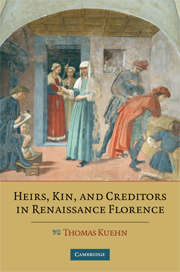Book contents
- Frontmatter
- Contents
- List of Tables
- Preface: The Ambivalence of Inheritance
- Introduction: Of Inheritance and Kinship
- 1 Family and Inheritance
- 2 Florentine Laws Regulating Inheritance and Repudiation
- 3 Repudiation and Inheritance
- 4 Profile of Florentine Repudiation and Inheritance
- 5 Repudiations and Household Wealth
- 6 Repudiation as an Inheritance Practice
- 7 Repudiations in Dispute
- Conclusion
- Appendix 1
- Appendix 2
- Appendix 3
- Appendix 4
- Appendix 5
- Appendix 6
- Sources and Abbreviations
- Index
7 - Repudiations in Dispute
Published online by Cambridge University Press: 17 August 2009
- Frontmatter
- Contents
- List of Tables
- Preface: The Ambivalence of Inheritance
- Introduction: Of Inheritance and Kinship
- 1 Family and Inheritance
- 2 Florentine Laws Regulating Inheritance and Repudiation
- 3 Repudiation and Inheritance
- 4 Profile of Florentine Repudiation and Inheritance
- 5 Repudiations and Household Wealth
- 6 Repudiation as an Inheritance Practice
- 7 Repudiations in Dispute
- Conclusion
- Appendix 1
- Appendix 2
- Appendix 3
- Appendix 4
- Appendix 5
- Appendix 6
- Sources and Abbreviations
- Index
Summary
In 1399, a case came to court in Florence that posed a vital issue at the heart of that city's attempt to discipline the use of repudiation of inheritance through its statutes. Two brothers, Jacopo and Niccolò di Guido, were found to be in possession of their father's property fifteen days after his death, although they had legally repudiated the paternal estate. Specifically, they were in possession of a substantial house described as “quoddam palatium.” Their father's creditors brought suit to recover against these sons on the strength of Florence's statute, which, as we have seen, held liable heirs in possession of the deceased's assets after fifteen days, despite repudiation.
Jacopo and Niccolò argued that they had the house not as heirs to their father but as heirs to their mother, for return of whose dowry, in the customary Florentine manner, the house had been pledged. Of course, the Florentine statute then in effect expressly precluded such a defense. It did not exempt possession on the basis of maternal inheritance. So these brothers offered a further argument that the house in question did not in fact belong to their father but to his brother (named Gaddo). However, the creditors too had another argument in their favor, as they claimed that Jacopo di Guido had acted as his father's heir when he sold another house his father had owned.
- Type
- Chapter
- Information
- Heirs, Kin, and Creditors in Renaissance Florence , pp. 179 - 208Publisher: Cambridge University PressPrint publication year: 2008



